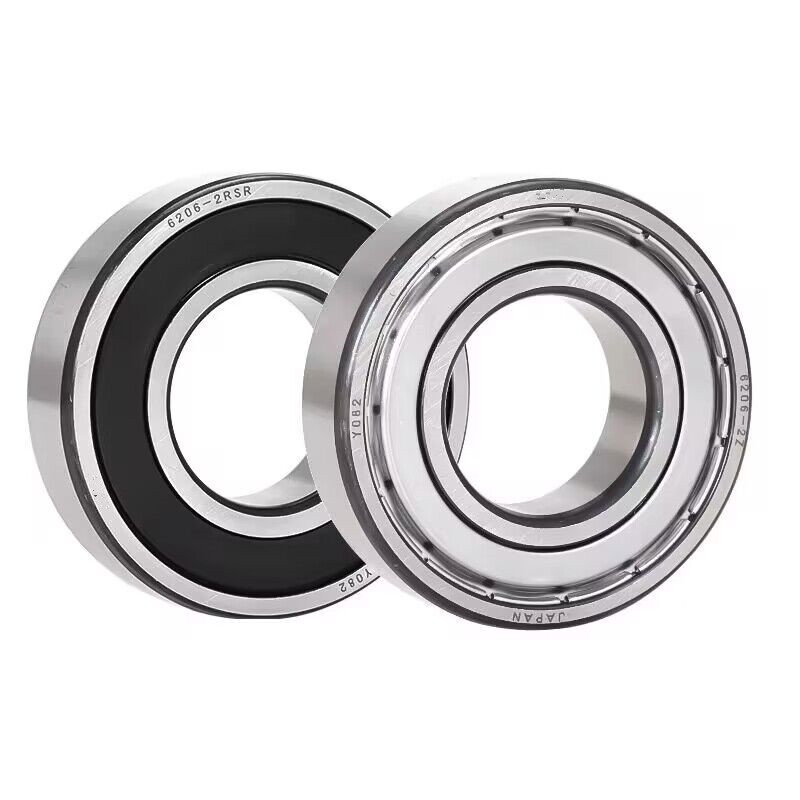It can be seen from the failure examples of rolling bearings used in oil-lubricated motors that most failures are caused by insufficient viscosity of the lubricating oil. The lower the viscosity of the lubricating oil, the worse the load-bearing capacity of the oil film, and the oil film is prone to rupture. The metal materials on the relative moving surfaces inside the rolling bearing will come into direct contact, resulting in increased friction and wear, and the service life of the rolling bearing will be significantly shortened or bearing failure will occur. Burn and breakage accidents. However, if the viscosity of the lubricating oil is too high, the friction resistance will increase, the heat generated by stirring the lubricant will increase, and the energy consumption of the system will increase. On the other hand, for rolling bearings operating under special conditions such as high speed, high load and high temperature, there may be special requirements for anti-rust, anti-oxidation, anti-wear and improved lubricating oil adsorption capacity. Therefore, the selection of lubricating oil mainly depends on the determination of the viscosity grade of the lubricating oil and the type of additives used or the selection of different lubricating oil products with certain additives. The general selection principles for lubricants are as follows.
1: Working temperature Working temperature affects the viscosity change and lubrication effect of lubricating oil. Therefore, when the working temperature is low, lubricating oil with lower viscosity should be used; when the working temperature is high, lubricating oil with high viscosity or appropriate additives should be used. The viscosity of the selected lubricating oil should also change depending on the ambient temperature. For example, lubricating oil with a lower viscosity should be used to lubricate the same bearing in winter than in the south or summer. When the operating temperature changes frequently, lubricating oil with excellent viscosity-temperature characteristics should also be selected, that is, the viscosity of the lubricating oil used does not change much with the increase or decrease of the operating temperature to ensure that the oil film thickness is stable within a certain range.
2: The higher the movement speed, the more lubricating oil with lower viscosity should be used to avoid increased movement resistance and excessive heat generation; conversely, at low speed, lubricating oil with higher viscosity should be used to increase the load-bearing capacity. ability.
Three: Nature of movement: There are shocks, vibrations, frequent load changes, speed changes, and starting during movement. Frequent parking, reversing, and reciprocating or intermittent movements are not conducive to the formation of oil film, so lubricating oil with higher viscosity should be selected. Sometimes it is better to use grease or even solid lubricant to ensure reliable lubrication.
Four: The greater the load the working load rolling bearing bears, the higher the viscosity of the lubricating oil should be selected, and it should have good oiliness and extreme pressure properties to prevent the lubricating oil from being squeezed out of the friction pair or direct contact between metals. .
Five: Structural characteristics The smaller the radial clearance of the rolling bearing, the higher the processing accuracy of the friction surface, and the lower the viscosity of the lubricating oil should be.
Six: Environmental conditions: When the bearing works under conditions of moisture, corrosive gas, low temperature, dust, and strong radiation, the lubricating oil is easily contaminated and deteriorates. At this time, the lubricating oil should be selected to be water-resistant, anti-wear, corrosion-resistant, cold-resistant, and radiation-resistant. Strong lubricant. In places with serious splashes of running water, emulsion spray, humid air or dust and debris, it is generally not advisable to use lubricating oil, but grease.
7: Bearing Precision When the bearing’s friction surface is rough, oil with high viscosity is generally suitable to withstand the large local pressure caused by poor contact. When the precision of the movement friction surface is high, low-viscosity lubricating oil should be used to reduce the friction. Small unnecessary energy loss and temperature rise.
Eight: Bearing hardness When the hardness of the bearing’s friction surface is low, lubricating oil with high viscosity should be selected, and the amount of oil should be sufficient; conversely, the viscosity of the lubricating oil can be reduced. In order to give full play to the role of lubricants, be sure to choose a lubrication method and high-quality lubricants suitable for the use conditions. When assembling the motor, the grease injected into the bearing chamber must be clean. The grease is not clean and mixed with impurities, especially hard impurities, which can easily cause abnormal wear of the bearing and cause bearing failure. The filling amount of grease must be appropriate. If the amount is too little, the bearing will heat up due to intermittent lack of oil and dry grinding, causing bearing failure; if the amount is too much, the grease will heat up due to stirring, causing bearing failure, and it will also become thinner and throw out to pollute the inside of the motor. .
The motor grease must be filled according to the designed amount, and it must be reasonably distributed in the bearing chamber space. The bearing chamber space consists of three parts: the bearing cavity and the inner and outer bearing caps. The grease should be distributed as much as possible in the bearing cavity and the surface that can envelope the bearing. The filling of the space is determined by the rotation speed. During the operation of the motor, it is necessary to prevent the grease from deteriorating and losing, causing bearing failure. Special bearing grease should be replenished regularly and quantitatively, and an oil return pan is designed. It is strictly prohibited to mix different brands of grease to prevent the grease from deteriorating, losing its lubrication performance, and causing bearing failure.
Post time: Jan-17-2024

